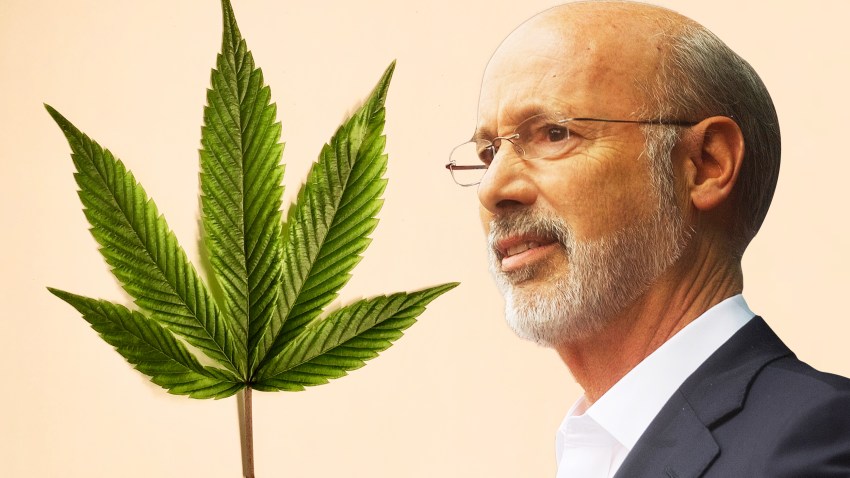PA GOVERNOR WOLF CALLS FOR LEGALIZING RECREATIONAL MARIJUANA, BUT GOP LAWMAKERS SAY IT’S A PIPE DREAM

BY CHARLES THOMPSON
republished below in full unedited for informational, educational & research purposes:
Gov. Tom Wolf on Tuesday proposed legalizing marijuana for recreational use by Pennsylvania adults, arguing that legislative leaders should take a serious look at the issue this fall given the serious hit the COVID-19 pandemic has taken on state revenues and the need to complete the state’s 2020-21 budget.
“This might be one way to plug a hole,” Wolf said.
And the leaders of the Republican-controlled legislature said, in essence: “Next issue?”
There may come a day when an issue that, over time - like gay marriage or gun control measures - has begun to find significant support in public opinion surveys finds a match for that support in the state Capitol. But, in the view of senior GOP legislative leaders and staffers, that day is not yet at hand.
“The speaker’s priorities are responsibly finishing the (2020-21 state) budget, doing what we need to do to continue the education of our children and reopening the economy so that our people can get back to work safely,” said Jake Smeltz, chief of staff to Speaker of the House Bryan Cutler, R-Lancaster County.
“One priority he does not have is to make sure that people can get high legally.”
Others even expressed indignation that Wolf would put marijuana legalization on the table right now, accusing him of political grandstanding as the campaign season starts to take center stage.
“It appears as if the governor is starting the fall campaign now after it’s become clear that legislative Democrats are feeling the pressure of his decisions to implement some of the most restrictive economic shutdown measures in the country and create an autocracy,” Senate Majority Leader Jake Corman, R-Centre County, said in a statement.
“The governor is clearly not interested in governing. If he were, he would have reached out to legislative leaders at some point during the summer to discuss a fall agenda. Instead, he sends out a political document and takes partisan shots at elected officials.”
Corman has long been an outspoken opponent of expanding the state’s current medical marijuana program to include recreational use for those 21 and older, and Senate GOP sources noted there is not a vocal champion for the issue now in the majority caucus in the way that former Sen. Mike Folmer, R-Lebanon, led the charge for medical marijuana several years ago.
For marijuana advocates, however, Wolf’s call did open up new possibilities for the political future.
Nationally, 11 states and Washington, D.C. have legalized marijuana for adult use to date, though the federal government still considers it to be a Schedule 1 substance on par with heroin and LSD.
Wolf, a Democrat, signalled his personal willingness to support marijuana legalization after the completion of his Lt. Gov. John Fetterman’s “listening tour” on the issue last year. But Tuesday was the first time that the governor specifically listed a proposal as part of his legislative agenda.
Public opinion polling in Pennsylvania across has shown support for marijuana legalization growing from under 40 percent in 2014, when Wolf was a first-time candidate for governor, to consistently scoring 56 to 59 percent support over the last three years, while opposition to it has hovered in the mid-30s.
And other elected officials, such as state Auditor General Eugene DePasquale, have championed the issue for several years. DePasquale’s office authored a report in 2018 that suggested the state could generate about $580 million annually in tax revenues, assuming a hefty 35 percent tax rate.
If the Democrats win a majority in the either the House or the Senate this fall, the cause might get even more of a boost. Republicans now hold a working 29-21 edge in the Senate, including Sen. John Yudichak, a one-time Democrat-turned-Independent who began caucusing with Senate Republicans last year; and a 109-93 majority in the House.
“Legalizing adult-use cannabis has widespread, but not universal, support among House Democrats,” House Democratic spokesman Bill Patton said Tuesday after Wolf’s announcement. “With the state facing a massive budget shortfall approaching $5 billion our leaders believe this is a revenue-producing option that ought to be considered now. And if not now, then early in 2021 when there is a House Democratic majority.”
But with Corman and Cutler personally opposed and largely reluctant to bring bills up for votes that don’t have majority support within their respective caucuses, and marijuana supporters facing inevitable clashes over what the proposed retail market would look like, fairness to the medical marijuana vendors who have already paid for their licenses, and where to set the tax rate, Wolf’s fresh push is unlikely to meet with near-term success even at a time when the state is running major revenue deficits.
“That’s a major policy change whether you’re for it or against it,” House Majority Leader Kerry Benninghoff, R-Centre County, told PennLive in a telephone interview Tuesday, “and it shouldn’t be driven just on a need for money.”
Wolf offered his broad marijuana pitch - Press Secretary Lyndsay Kensinger said specifics should be released within the next few weeks - as part of a fall legislative agenda that otherwise focuses on helping businesses and residents recover from the pandemic-induced recession and tweaking state election laws to clean-up first-time issues with the state’s optional mail-in voting program.
“We need to provide relief for families. We need to provide relief for small businesses,” Wolf said in a morning appearance at a day care outside Middletown. “House and Senate Democrats have been fighting for these things for years, and certainly since the beginning of the pandemic. But they’ve been stopped at every turn by the Republicans who have been focused on ignoring the public health crisis or actually trashing me.
“That has to stop, We’ve got to get back to doing things that actually matter to people.”
Drawing largely from $1 billion in unspent federal funds allocated to Pennsylvania in the federal Coronavirus Aid, Relief, and Economic Security Act, Wolf proposed allocating:
- $327 million to increase accessibility to child care for families with new-found needs because their children are not going to school day-in, day-out for in-person classes, or to set up new wrap-around programs like community classrooms where students without Internet access at home could receive safe, supervised out-of-school supports.
- $325 million in grants and forgivable loans to small businesses that faced revenue losses because of the pandemic, with $100 million of that carved out specifically for restaurants, bars and other leisure and personal service business that were among the first to be forced to close and, in many cases, still haven’t been able to fully reopen.
- $225 million for an expanded and extended “hazard pay” program, pushing bonuses to many more health care, food supply and other workers who have worked through the pandemic, keeping essential goods and services available. The state launched a $50 million, 10-week hazard pay bonus reaching about 40,000 workers earlier this summer.
- $100 million to help support persons facing the threat of public utility shut-offs after service termination moratoriums are lifted later this year.
- $100 million to households that have fallen behind on monthly rental payments.
Wolf also voiced support Tuesday for government reform efforts including a ban on gifts to all state legislative and executive branch workers, and comprehensive campaign finance reform.
All the legislative caucuses have in the past signaled their interest in working with the governor to ease the pain that the pandemic-related shutdowns inflicted on the state’s economy. Pennsylvania’s unemployment rate stood at 13.7 percent in July, the fifth-highest state jobless rate in the nation, and pandemic response is what the state’s remaining CARES Act funds are supposed to be used for.
Benninghoff said GOP lawmakers have always been interested in re-igniting the state’s economy from the effects of a shutdown that many of his members feel was broader and longer than it had to be, and he said they have a lot of ideas to put on the table, too. “That laundry list of the governor’s is not the only things that are needed in the state,” Benninghoff said.
Wolf said any revenues raised from marijuana legalization would be used both to top off the available CARES Act funding to support his relief package in the short term, and longer-term to support “restorative justice” programs aimed at helping to repair damage that advocates say the generations of marijuana prosecutions have down to those arrested and the neighborhood where those arrests have been concentrated.
On Tuesday, however, legislative leaders made clear that’s one priority that’s not shared.
Under the current schedule, the House is expected to return to voting session on Sept. 1, to begin 12 days of scheduled session time through the fall. The Senate is set to return Sept. 8. It also has 12 voting days scheduled.
___________________________________________________________________________________
EXCERPTS BELOW FROM: https://pittsburgh.cbslocal.com/2020/08/25/governor-tom-wolf-wants-to-legalize-recreational-marijuana/
During a press conference on COVID-19 recovery, Gov. Wolf called on the legislature to legalize recreational marijuana with the proceeds going to existing small business grant funding.
According to a press release by the Governor’s office:
“Fifty percent of the funding would be earmarked for historically disadvantaged businesses. Along with the call to the General Assembly to pass legislation legalizing the sale and use of recreational marijuana, the governor proposes that a portion of the revenue be used to further restorative justice programs that give priority to repairing the harm done to crime victims and communities as a result of marijuana criminalization.”
